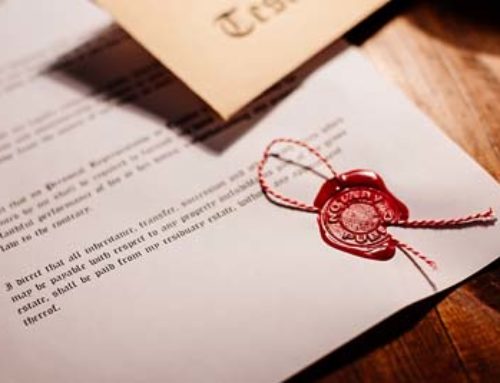 It is quite common among foreign citizens when signing their Spanish Wills to leave the assets they have in Spain first to the spouse and then to the children (in case of predeceasing, renounce or simultaneous decease). This is slightly different for Spanish citizens as due to the “legítima”, which is the legal obligation to leave certain rights over parts of the inheritance to the children, parents or spouse, it is common that testamentary dispositions include the right of usufruct in favor of the spouse. Although the Civil Code recognizes only the usufruct of a third of the inheritance (known as Improvement third) in most cases testamentary dispositions include what is known as universal usufruct of the surviving spouse. Let’s see how this right works and if that may be also a valid option for the testaments of foreigners who own property in Spain.
It is quite common among foreign citizens when signing their Spanish Wills to leave the assets they have in Spain first to the spouse and then to the children (in case of predeceasing, renounce or simultaneous decease). This is slightly different for Spanish citizens as due to the “legítima”, which is the legal obligation to leave certain rights over parts of the inheritance to the children, parents or spouse, it is common that testamentary dispositions include the right of usufruct in favor of the spouse. Although the Civil Code recognizes only the usufruct of a third of the inheritance (known as Improvement third) in most cases testamentary dispositions include what is known as universal usufruct of the surviving spouse. Let’s see how this right works and if that may be also a valid option for the testaments of foreigners who own property in Spain.
What is a usufruct? Some general concepts
Usufruct is a real right or right in rem that has its origin in Roman law. Etymologically it comes from the Latin usus and fructus, meaning the use or enjoy and the right to any profit or yield generated (fruit). It therefore consists on using and enjoying the property of others. The owner of this right holds possession of the property, uses and enjoys the yield or income generated, either in kind or monetary, but he/she cannot fully dispose of the property. They cannot transmit, alter or encumber it, nor decrease its value, since it is owned by a third party.
Usufruct, while it lasts, temporarily splits the rights inherent to the private ownership. The usufructuary is entitled to use the goods as well as get the yield (for example, the income obtained from renting a property), while the so called bare owner retains only the right to dispose of the same, but without being able to use it or receive the profit that might generate. Only at the end of the usufruct the bare owner acquires full ownership of the property.
Usufruct is regulated by Spanish law in Chapter One of Title VI of the Civil Code (Articles 467-522).
Usufruct may be total or partial depending on whether it affects the whole good or part of it, and it can be also temporary or for a lifetime.
The constitution of the usufruct may be legal if imposed by law (legitima for the improvement third in favour of the widowed spouse) or voluntary if it arises from a party choice like a private contract or a testamentary disposition.
Universal usufruct in favour of the spouse
Let’s focus on universal usufruct constituted in the will of the deceased in favor of the surviving spouse. Consider a couple that own a property in Spain. In their respective wills both appoint their children to inherit the bare ownership of their half and the partner to receive the lifetime usufruct. This means that upon the death of one of them, the children would inherit 50% of the property, but would not be able to use it or rent it because the surviving spouse will now have, not just 50% of the full ownership but also the exclusive and exclusionary right to use and enjoy the other 50% during his/her lifetime.
The usufructuary, therefore, has the exclusive right to use the property until his/her death, to rent it and collect the rents, to sell its products (ie: farm), to dispose of his/her usufruct rights, for example by leasing, transferring or charging it while it is valid, and to improve the good as its form and substance are not altered.
The main obligation of the usufructuary is to preserve the property as well as to meet the payment of Town Hall rates (IBI), the ordinary expenses of the Community of Owners and maintenance costs and utilities, according to Articles 63 and 61 of Legislative Royal Decree 2/2004 (Law for Local Taxation) and Article 504 of the Civil Code.
The bare owners have the obligation to deliver the goods to the usufructuary and allow the peaceful enjoyment of it, to pay the taxes on the property and to cover the costs of extraordinary repairs. On the other hand, they are entitled to receive the property back upon expiration of the lifetime usufruct.
The death or the renounce of the usufructuary as well as the loss of the asset cause the end of the lifetime usufruct right.
The Socini clause
Under the Civil Code, the surviving spouse is legally entitled only to the lifetime usufruct of the so called Improvement third when they concur with children to the inheritance. The children themselves have by law the full ownership of the third known as strict legitima that needs to be equally divided between them, plus the bare ownership of the improvement third when they concur with the surviving spouse and in the proportion determined by the testator. The other third is of free disposition and can be left to anyone. A testamentary clause known as the “Socini measure of caution” arose to harmonize these legitima rights with the possibility of bequeathing the universal lifetime usufruct. In virtue of this disposition the testator leaves to the heirs more than what legally correspond to them as legitima, but with the condition to withstand the lifetime usufruct of the spouse widower on all goods. Thus, if a heir intends to violate this condition through a judicial claim for their legitimate rights, inheritance is limited in their case to the strict legitima, that is the part that corresponds to them out of just one third of the estate.
The Supreme Court declared the validity of the Socini measure of caution though it is not specifically regulated by the Civil Code.
Valuation and taxation of the lifetime usufruct
For the purpose of liquidating the taxes that may accrue, it is necessary to assess the overall value of the property subject to the right, the value of the usufruct and the value of the bare ownership.
The value of the lifetime usufruct is equal to 70% of the total value of the freehold property where the beneficial owner is under 20 years old, decreasing by 1% for each year over this age and with a minimum value of 10% and a maximum of 70%.
The formula to calculate the percentage of the overall value corresponding to the lifetime usufruct is to subtract the age of the usufructuary to the number 89.
Example: The value of the lifetime usufruct on a home valued at € 300,000 and being the age of the usufructuary 69 years old is as follows:
Usufruct = 89 – 69 = 20%
€ 300,000 x 20% = € 60,000
The value of the usufruct will be 20% of the total value, that is € 60.000, and the value of the bare ownership will, therefore, be the remaining 80%, that is € 240,000.
As commented in recent entries in this blog on inheritances and inheritance tax, from 1 January 2015 many of the spouses inheriting the lifetime usufruct or the children inheriting the bare ownership would pay little or nothing due to the bonuses, reductions and deductions that now are also applicable to non-residents in Spain that have their domicile in countries of the European Economic Area.
Commutation
While the surviving spouses may want to continue enjoying for the rest of their life the property or the income generated by its rental, they might also prefer to receive an annuity or an amount of money to compensate their right of usufruct, and that would allow the bare owners to unify the full dominium before the death of the usufructuary. It is known as commutation. This case is more likely to happen where the usufructuary is a spouse in remarriage and the bare owners are the children of a previous marriage.
It consists in swapping the property or properties that the widower has received in usufruct through inheritance by an annuity, cash or certain material goods. Commutation can be made without the consent of the widower, providing that it has not been banned by the testator, and only where the usufruct involves just the improvement third as determined by the Civil Code. When the usufruct is universal (for all the goods) commutation must be made by mutual agreement with the widower and it can not be imposed.
Luis M. Vicente Burgos
VICENTE & OTAOLAURRUCHI ABOGADOS






